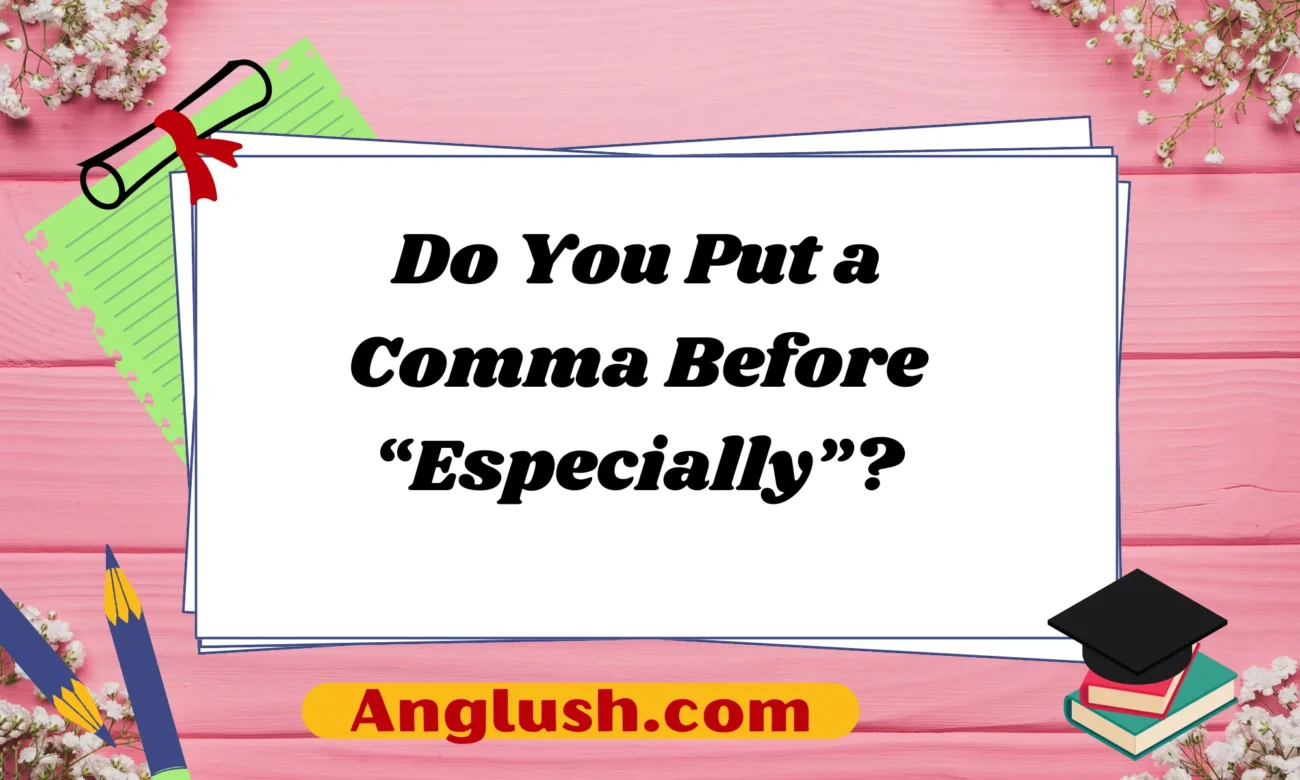Introduction
The English language is full of grammatical rules, many of which can be confusing—especially when it comes to punctuation. One common question that arises is whether to place a comma before the word especially. The answer depends on how especially is used in a sentence.
In this article, we will explore:
- The grammatical role of especially
- When a comma is necessary
- Situations where a comma should be avoided
- Examples of especially in sentences with and without commas
- Alternative words and phrases to use instead of especially
By the end of this article, you’ll have a clear understanding of how to correctly use especially in writing and how punctuation affects clarity and readability.
The Function of “Especially” in a Sentence
The word especially is an adverb that means “particularly” or “to a great extent.” It is often used to emphasize a specific point, a standout example, or a notable exception in a sentence.
Types of Sentence Structures with “Especially”
- Modifying an Adjective or Another Adverb
- Example: The weather was especially cold this morning.
- Here, especially intensifies the adjective cold, and no comma is needed.
- Introducing an Example or Clarification
- Example: I love desserts, especially chocolate cake.
- In this case, especially highlights an example, and whether a comma is necessary depends on the sentence structure.
- Adding Extra Emphasis to a Clause
- Example: She was nervous about the test, especially because she hadn’t studied.
- Here, especially introduces a clause and adds emphasis to the reason for nervousness.
When Do You Put a Comma Before “Especially”?
Whether you should use a comma before especially depends on how it functions in the sentence. Below are the primary scenarios where a comma is required:
1. When “Especially” Introduces a Non-Essential Phrase
A non-essential phrase is additional information that can be removed without changing the core meaning of the sentence. In this case, a comma is needed.
- ✅ Example: I enjoy outdoor activities, especially hiking in the mountains.
- ✅ Example: He likes Italian food, especially pasta with Alfredo sauce.
In both cases, especially introduces a non-essential detail, and the comma helps separate it from the main part of the sentence.
2. When “Especially” Comes at the End of a Sentence for Emphasis
If especially appears at the end of a sentence to highlight a specific aspect, it is usually preceded by a comma.
- ✅ Example: I love traveling, especially.
- ✅ Example: She enjoys classical music, especially.
In these cases, the comma signals a pause, allowing the emphasis to stand out clearly.
When Should You Avoid a Comma Before “Especially”?
While a comma is necessary in some cases, there are instances where it should not be used.
1. When “Especially” Directly Modifies an Adjective or Adverb
If especially is modifying an adjective, adverb, or verb, a comma is not needed.
- ❌ Incorrect: The cake was, especially delicious.
- ✅ Correct: The cake was especially delicious.
2. When “Especially” is Part of a Restrictive Clause
A restrictive clause contains essential information. When especially is used in this way, a comma is unnecessary.
- ❌ Incorrect: She loves books, especially those about history.
- ✅ Correct: She loves books especially those about history.
In the correct version, especially is an integral part of the sentence and does not require a comma.
Examples of Sentences With and Without a Comma Before “Especially”
| Sentence | Correct Usage |
| I enjoy playing sports, especially basketball. | ✅ Comma needed (non-essential phrase) |
| She works hard, especially when facing challenges. | ✅ Comma needed (emphasis on a clause) |
| The coffee was especially strong this morning. | ✅ No comma needed (modifying an adjective) |
| He admires artists especially those who paint landscapes. | ✅ No comma needed (restrictive clause) |
Alternative Words and Phrases for “Especially”
If you want to avoid repetition or make your writing more engaging, you can use alternatives to especially. Below are some options categorized by formality.
Formal Alternatives
- Particularly
- Example: I enjoy classical music, particularly Mozart’s compositions.
- Notably
- Example: He has visited several countries, notably Japan and Italy.
- Specifically
- Example: The new policy benefits students, specifically those in low-income areas.
Neutral Alternatives
- In particular
- Example: She loves literature, in particular, 19th-century novels.
- Most of all
- Example: I appreciate kindness, most of all, honesty.
Casual Alternatives
- Mainly
- Example: He plays video games, mainly strategy-based ones.
- Above all
- Example: I love summer, above all, for the long days.
11 Texting Examples for “Especially” and Its Alternatives
- “I love all kinds of music, especially jazz. 🎶”
- “Let’s go somewhere warm for vacation, particularly Hawaii! ☀️”
- “I enjoy watching sports, notably basketball and soccer. 🏀⚽”
- “She’s good at all subjects, in particular math. 📚”
- “I love desserts, mainly chocolate ones. 🍫”
- “I appreciate honesty, most of all, sincerity. ❤️”
- “We should focus on our top priorities, above all our health. 💪”
- “I enjoy outdoor activities, specifically hiking. 🏔️”
- “The test was tough, especially the last question! 😩”
- “He loves movies, particularly action films. 🎬”
- “She’s amazing at sports, notably tennis. 🎾”
Final Thoughts
Using especially correctly in writing requires understanding when to use a comma and when to leave it out. As a general rule:
- Use a comma when especially introduces a non-essential phrase or adds emphasis at the end.
- Avoid a comma when especially modifies an adjective, adverb, or verb.
By paying attention to sentence structure and punctuation, you can enhance clarity and readability. If you want variety, consider using synonyms like particularly, notably, or in particular.

